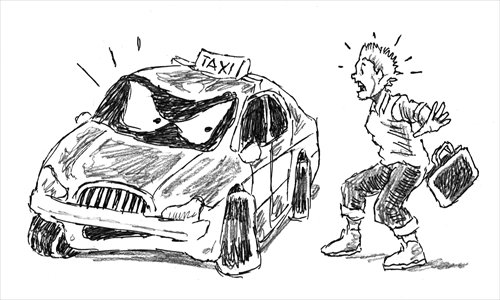We’re paying a high price for low taxi fares

It was late at night when I got into the heiche ("black car" or illegal taxi). The university I was staying at was over an hour away and there was no way I was going to persuade a licensed taxi driver to go out there. Within a few minutes, I wished I'd noticed the driver's bloodshot eyes and the way his head would droop as if he was falling asleep. I wasn't sure if it was alcohol or exhaustion, but by then it was too late to stop the taxi. I was on the open highway and there was no way I was going to find another ride.
Still, as the car drifted across lanes and I frantically spoke to my driver in halting Chinese to keep him awake, I considered stopping anyway, hoping for some kind of miracle that would get me from a lonely Chinese highway in the middle of the night to where I was staying. Of course, I made it home and was polite to the driver right up until the moment I stepped out of his car. Then, in words I don't care to repeat, I shouted at him to go home and sleep.
The recent news that police at Beijing Capital International Airport are clamping down on unlicensed taxis is welcome, but I fear it's treating the symptom rather than the cause of the problem.
While my experience occurred near Ji'nan, Shandong Province, black taxis are a common sight in most Chinese cities including Beijing. There are plenty of reasons for this. The cost of just about everything in Beijing has skyrocketed in recent years, but the government has kept taxi fares low.
When you also consider the fact that taxi companies demand outrageous licence fees from drivers, you begin to understand why cabbies in the capital always seem to be in a bad mood.
They work in a profession that pays them low wages, in a city where living costs have far outpaced wage growth. It has become an unattractive profession, so demand for taxis now outpaces supply.
When authorities urge foreigners to only take legal taxis, I, like most expats in the capital, do my best to oblige. Legal taxis are generally cheaper and far more preferable, but it's not always possible to find one, especially during poor weather or late on Friday or Saturday nights.
This is where the heiche fleet steps in. They are filling a very real need, but their widespread use has dangerous ramifications for public safety. Although Beijing is a comparatively safe city, there's always an element of risk when you take a heiche.
Beyond my experiences with red-eyed drivers, there have been reports of foreigners being sexually assaulted by private car owners who moonlight as cabdrivers. There's also the risk of having luggage or money stolen, coupled with the guarantee of being charged an exorbitant fare.
The only solution to this problem is getting more licensed taxis on the roads. To do this, the government needs to ensure that driving a taxi remains a worthwhile profession. Prices should be allowed to rise in line with living costs in the capital, but increased competition (in the form of more taxi companies) needs to be introduced to ensure they don't get out of control. This would also help regulate the fees that taxi companies can charge their drivers, but the government should be keeping an eye on those fees as well.
This would mean more licensed taxis on the roads, fewer heiche preying on the vulnerable and, ultimately, a safer and more convenient Beijing for all.